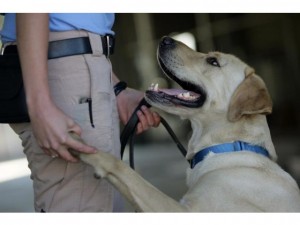By Jan Sears
The work day starts early for Bishop, a gangly yellow lab, and his handler, Kristina Cummings.
By 4:30 a.m. the two San Bernardino County agriculture department workers are on the job, checking out boxes that are being loaded onto trucks at UPS or Fed-Ex shipping hubs.
The good-natured dog isn’t hunting for drugs or weapons – he’s searching for fruit, vegetables, plant material, soil or live insects. When he sniffs out a box with anything like that inside, he eagerly pounces on it, digging so energetically he sometimes dents or punctures the box.
Cummings, 28, and her partner, Joshua Hardeman, 25, set the box aside and Hardeman opens it to see if it’s something the dog was trained to find. If so, Bishop gets a treat.
Some days, Bishop gets lots of treats.
“At UPS today, he alerted on 42 boxes,” Cummings said Tuesday, Feb. 10.
Not everything he finds is a forbidden substance.
Many of the boxes Bishop alerts on have been properly inspected and certified. Those usually, though not always, are found to be pest-free and sent along their way. It’s the fruit and plants arriving in unmarked boxes that are the biggest problem.
On Jan. 2, Bishop made a major find at a Fed-Ex shipping hub in Ontario. He sniffed out an unmarked box that was found to contain seven pounds of mandarin oranges sent from Louisiana, said Sandy Cleland, deputy agriculture commissioner in San Bernardino County.
Along with the mandarins were stems and leaves and two A-rated pests – citrus snow scale and tea scale. The A rating means that if the pests got into California’s citrus crops, they could have a significant negative economic impact.
The shipment also violated a federal quarantine for huanglongbing, or citrus greening disease, and the Asian citrus psyllid, which carries the disease.
The California Department of Food and Agriculture has 13 dog teams checking for illegally shipped agricultural material in counties with major shipping hubs, from San Francisco and Sacramento south to San Diego.
Like the other dogs, Bishop spends his days in busy, noisy, sometimes hot warehouses, picking through boxes on moving conveyor belts, checking out rolling bins loaded with parcels and stretching up to give boxes on shelves a once over.
The San Bernardino County Department of Agriculture/Weights and Measures had two teams as recently as February 2014, but detector dog Kiwi had to retire because of a torn ligament. Hardeman adopted her.



